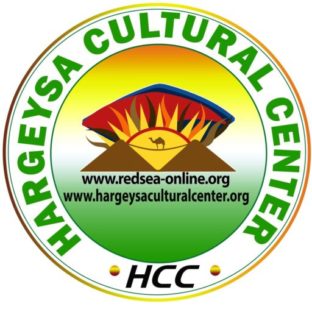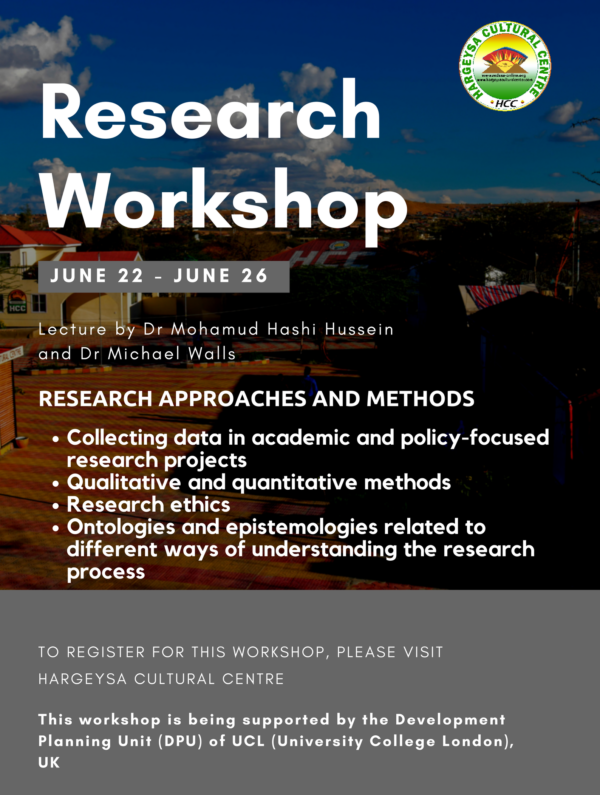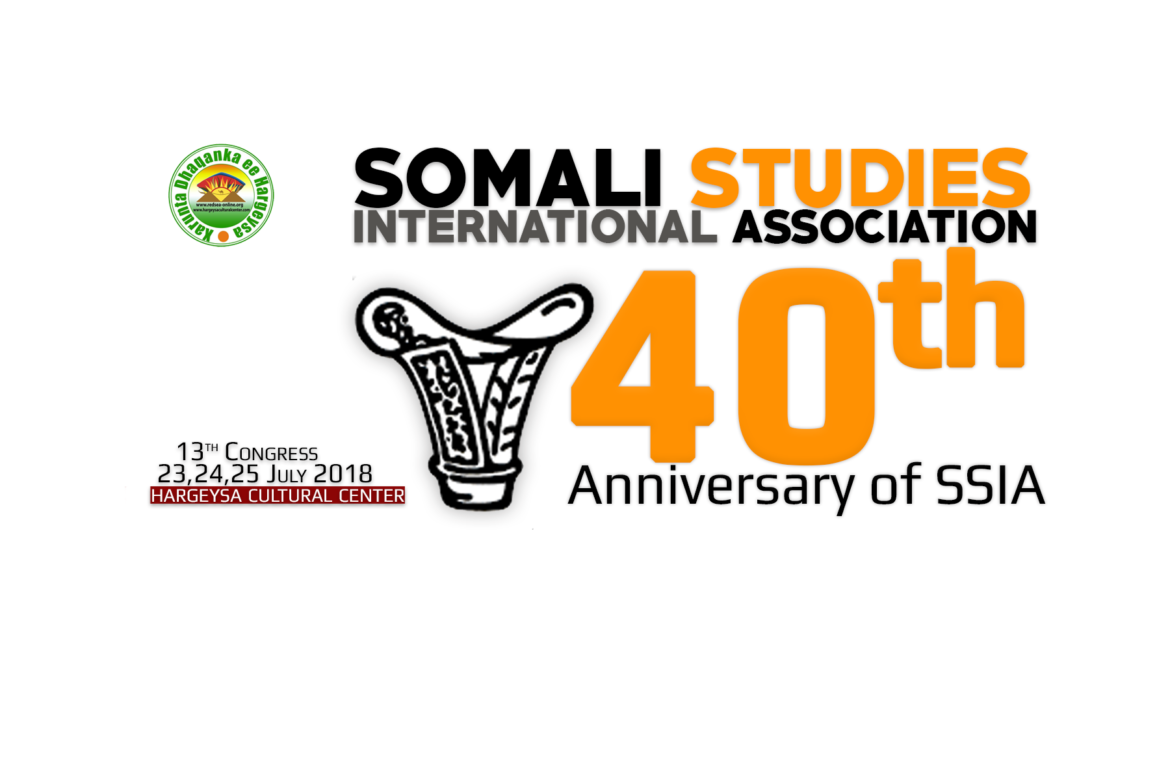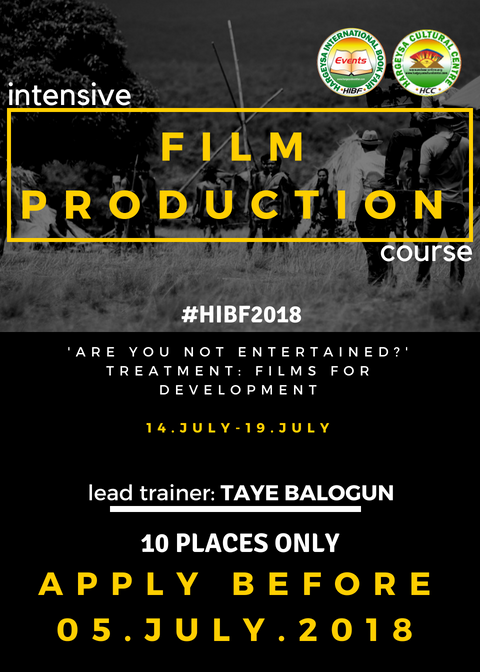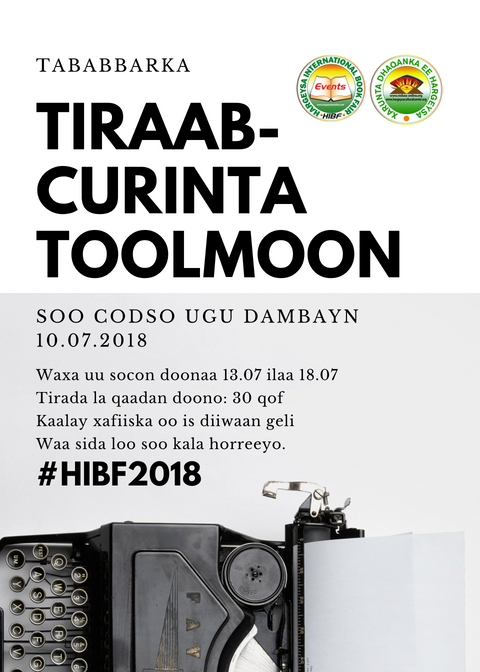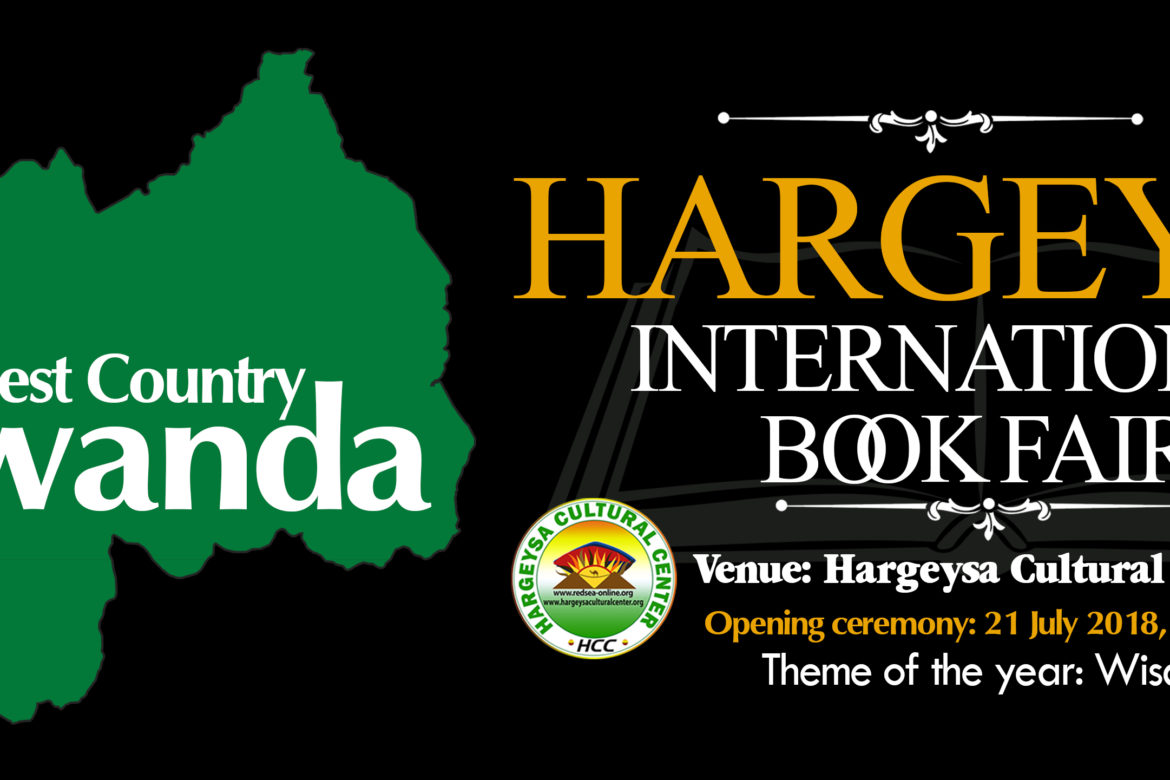Somali Studies International Association
Somali Studies International Association was established in 1978. It is an organization that has played a central role in defining the field of modern Somali Studies, and since its establishment, it has organized 12 International Congresses, and many other regional and continental conferences. Out of the 12 International congresses, only four took place in the Somali speaking territories. 40 years later, it is high time for SSIA to hold its Congress in the Horn of Africa. In fact holding 2018 SSIA in Hargeysa will enable Somali studies to reconnect with the current reality on the ground. The last time a full congress was held on Somali soil was in 2001 in Hargeysa and in 2007 Djibouti co-hosted.
The initiative would assist young Somali scholars to close the feelings of disconnect they feel with academia as whole and thereby positively encourage young Somalis to be more active and feel ownership over scholarly contributions. Additionally the legitimate subjects of Somali Studies are not necessarily Somali’s who have avenues to participate, object, contribute and debate in the Diaspora, but rather local Somali people in Somali territories that lack the academic platforms to engage with Somali Studies beyond being subjects of study. Holding it here in conjunction with state and private Universities will provide legitimacy and access to a hard reached population. Local Somali scholars are missing two fundamental things: firstly institutions to provide backing of their work and secondly the recognition and platform to showcase their work. For this reason 2018 SSIA congress will be jointly held in Hargeysa by Somali institutions and some western Universities who already work in the Somali territories to benefit key stakeholders. Please read more here.
Film Production Course
‘Are You Not Entertained?’ Treatment: Films for Development
An intensive course on Film Production at Hargeysa Cultural Centre
“Whenever am faced with this question, why Films for Development? My answer has always been – My observations became an obligation.” Says Taye Balgun, Taye is a film director/photographer, pan Africanist, activist, social justice campaigner and a teacher.
The course
There are too many entertainers across the world but not enough content to create a critical thinking, provoke minds and trigger change. As a part of Hargeysa International Book Fair pre-activities, Redsea Cultural Foundation is organizing this year at Hargeysa Cultural Centre, a film production workshop that will take the following structure:
- IDEATION: Identifying a problem. This is a simple discussion forum.
- RESEARCH: Why is it a problem? Maybe its not a problem elsewhere. How did the problem occurred?
- CONCEPT: Will our approach to the subject matter create awareness, provide solution or provoke discussion? A 360 or 180 perspective.
- FOCUS GROUP: Who are we targeting? Policy makers, NGO, Grassroots folks, Youth, Experts etc What action do we expect from them?
- STORYBOARDING: A sketchy visual narration. If you can visualise your story, you can’t achieve it.
- SCRIPTING: Creation of the flow of storyline. Put words on paper, let others read it.
- PRODUCTION: Film techniques and style of storytelling. Let the shoot begins.
The workshop will be more interactive and hands-on. Runing five full days, from 14th – 19th, the course organizers expect to have a tangible outcome: A 2 minutes video.
Biography of the lead trainer
Taye Balogun is a Film Director/Photographer, Activist, Educator and a Campaigner. From directing Broadway Musicals to feature films with special emphasis on impact production. Taye has consulted, campaigned and engaged with several international organizations/bodies {Control Arms, Water Aid, Oxfam, HelpAge, SOTU, Save The Children, African Union, UNESCO, AYICC, Amnesty International, Action Aid e.t.c} on issues ranging from Water and Sanitation, Gender Equality, Youth Empowerment, Women/Human Rights, Climate Change, Peace and Security, and Arms Control. He is the Director of Media and Campaigns of African Artists Peace Initiative (www.aapiafrica.org) – a pan African movement of Artists and Peacemakers working closely with the African Union and UNESCO. Taye is an Alumni of the UNLEASH – a global Lab on SDG’s where he advocated for quality education for all . Taye taught Acting/Filmmaking for 4 years, and presently teaches Films for Development, which has attracted an invite to present his work in Harvard University, Howard University and Georgetown University in the United States. Taye is currently working on his first book titled GUNS, GUTS & GOD and his 7th feature film titled THE BLUE KHAFTAN. www.tayebalogun.com
Other film makers who attend the Hargeysa International Book Fair and Somali Studies International Association Congress, will meet the trainees after the workshop for further improvement.
Tababbarta Tiraabcurinta Toolmoon
QORAAL-CURINTA TOOLMOON
Tababbarrada Xarunta Dhaqanka ee Hargeysa, 2018
Xarunta Dhaqanka ee Hargeysa waxa ka furmi doona tababbar ku saabsan qoraal-curinta toolmoon, gaar ahaan qaybaha maansada, riwaayadaha, filimmada iyo sheekada gaaban. Tababbarkani kuwii sannadihii ka horreeyay ayuu kaabayaa. Waana mid loogu talo galay in ay ka faa’idaystaan dadka ku hawlan qoraalcurinta, saxaafadda, ardeyda barata suugaanta iyo kuwii la mid ah.
Muddada tababbarku soconayaa waa toddobaad 13ka Julaay ilaa 18ka Julaay 2018, Xarunta Dhaqanka ayuuna ku qabsoomayaa. Waxa casharrada bixin doona barayaal ku xeeldheer qoraal-curinta toolmoon waxana, marti ku ahaan doona barayaal iyo xirfadlayaal warbaahinta ku jira oo la wadaagi doona ardeyda waaya-aragnimadooda. Siciid Saalax Axmed, Siciid Jaamac Xuseen, Cabdillaahi Cawed Cige, Saynab Aadan Sharci, Maxamed Baashe X. Xasan, Maxamuud Sheekh Dalmar, Cabdalla Cismaan Shafey, Maxamed Xirsi Guuleed, Maxamed Cali Xasan “Alto”, Dr. Jaamac Muuse Jaamac.
Tababbarku waa lacag-la’aan waxana lagu dhiirri gelinayaa dadka ku hawlan qoraalcurinta iyo kuwa warbaahinta ka shaqeeya, kuwaas oo loo kala tix gelinayo siday u soo kala horreeyaan.
Qofka danaynaya inuu ka qayb galo waxa looga baahan yahay:
- In uu yimaaddo xafiisyada Xarunta Dhaqanka ee Hargeysa oo ku yaalla Shacabka, Waddada 26ka Juun ee wadnaha Hargeysa, isla markaana is qoro.
- In uu xubin ka yahay Xarunta Dhaqanka oo haystaa kaadhka xubinnimada, qofkii aan haysanna marka uu yimaaddo ayuu is diiwaan gelin karaa.
Wixii faahfaahin ah la soo xidhiidh cinwaanka courses@redsea-online.org
Macallin Siciid Jaamac Xuseen
Hagaha Sannadkan ee Tabobbarada Xarunta
Lifaaq: Casharrada lagu baranayo tabobbarka
CASHARRADA LAGU BARANAYO:
Aasaaska qoraalka Af Soomaaliga
Hordhaca aqoonta afafka
Sugitaanka naxwaha iyo xasilloonidarrada qoraalka Af Soomaaliga
Soohdimaha ereyada iyo astaamaha hadalka kala sooca
Doorka shaqalka iyo shibbanaha
Shibbanayaasha labanlaabma iyo higgaad-sixidda kale ee Af Soomaaliga
Qoraalcurinta suugaanta
Fikirka ka dhexeeya qoraalcurinta iyo qaybaha suugaanta
Riwaayadaha, qoraalkooda iyo jiliddooda
Filimmada, qoraalkooda iyo hagistooda
Maansada iyo abla-ablaynteeda
Sheekada gaaban iyo curinteeda
Af Soomaaliga iyo farsamada cusub
Agabka farsamada cusub iyo caqabadaha hor taagan Af Soomaaliga
Agabka farsamada cusub iyo miisaanka maansada
Kaydka Af Soomaaliga: iscugashada, is-ahaanshaha iyo abtirsiimada ereyga.
Isdiiwaangelintu waxa ay xidhmaysaa Salaasa, 10/07/2018, 2:30 pm.
11th Hargeysa International Book Fair
11th Hargeysa International Book Fair – 21-26 July 2018, Hargeysa, Somaliland
We are pleased to announce that the Hargeysa International Book Fair (HIBF) will held 21-26 July 2018 in Hargeysa, Somaliland. Last year, we celebrated the festival’s 10th anniversary with our chosen theme of Connectivity, this year we start the next decade with our theme of Wisdom. As an organization we have always sort to promote a “connected, open, creative and tolerant society led by wisdom”, and not by emotions; a society that has survived within its own mechanism, culture, heritage and knowledge production. From the 9th century BeytulHekmi (or Dar’ulHekma) in the Islamic Golden Age in Bagdad to the Somali wise men and women who guided the society in the traditional judiciary system, and who governed with authoritative leadership, the virtue of having wisdom as attribute, always gave few people a distinguished mandate to lead. What happened to that virtue? Who are our chosen vanguards today? What do the literature, the traditional oral poetry and arts had to do with the wisdom? Are men of literature loosing their appeal? Do the radical transformation of the Somali society in the recent time deteriorated the essence of wisdom of the ordinary people? These are the questions that we will seek to answer collectively.
Intertwined with this, HIBF2018 will be hosting Somali Studies International Association 22-24 July 2018 (SSIA18), with Somali knowledge production filled by foreign people (something we often ignore) during a period of difficulties of war – it is important to consider how that factor changed Somali literature and how with a young Somali scholars emerging once again to claim their space within Somali knowledge production- this yet again will change and shape our understanding.
Last year we had the privilege of hosting South Africa as our guest country- this year we will welcome Rwanda, a country which less than three decades ago was embroiled in horrific genocide, but which has reemerged as a proud, progressive and leading country in Africa. Rwanda is also reclaiming its narrative and knowledge production and we are pleased to welcome writers, poets and film-makers, but also policy makers and influential people that shaped the recent history of Rwanda. The parallel between Somaliland’s own difficult recent history and road recovery are many- and with Rwanda’s president Paul Kagame elected as the 2018 chairperson for African Union, it seems that their futures are also intertwined.
We look forward to welcoming each and every one of you to Hargeysa International Book Fair 2018.
Dr. Jama Musse Jama
Director,
Hargeysa Cultural Center
20th March 2018
